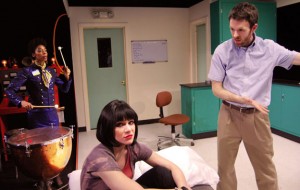“boom,” a modern tale complete with cursing, Ramen noodles, Craigslist solicitation and many failed sexual advances, reverts back to the story of Adam and Eve while attempting to prove the power of evolution.

Simultaneously depicting two universes — one, the end of the world as humans know it, and the other, the far-distant future — is a challenge in this play, but the Kitchen Theatre Company’s production of “boom” brings it to life on an Earth where very little exists.
The new comedy by emerging playwright Peter Sinn Nachtrieb details how two dysfunctional human beings, fish-obsessed graduate student Jules (Jimmy King) and freshman journalism major Jo (Alison Scaramella), wind up together. Because of Jules’ online solicitation for sex, they stay safe in his underground laboratory while a comet ravages the rest of the planet. Many years into the future, the enthusiastic museum tour guide Barbara (Ronica V. Reddick) retells their story through an exhibit and, at times, even changes their actions with a pull of a lever to ensure the survival of the human race.
King convincingly portrays an optimistic yet deluded scientist hoping to save the planet. As the originator of the role at Brown/Trinity Playwrights Rep, he brings spot-on comedic timing and entertaining physicality to the closeted gay character.
After Jo responds to Jules’ online ad promising a sexual experience that will “alter humanity,” his reaction as she tries to undress him — an entertaining lack of sensuality punctuated with yelps — is sidesplitting. King’s loyalty to Darwinian principles drives the scientific aspects of the play. There is no doubt he wants to save mankind and restart the population, even though he isn’t attracted to women.
The snappy back-and-forth dialogue and hilarious, modern one-liners help maintain a light air as Jo and James face their grim reality: living for years underground on their ruined planet. Alternately displaying her cynical youth and troubled adulthood, Scaramella proves herself an actress of both comedic and dramatic worth.
Jo’s inability to leave the lab comes from the machine controlled by the outrageously hilarious Ronica V. Reddick ’03 as Barbara, who freezes the characters on stage with her machine. She addresses the audience to discuss the importance of knowing their human origins and to complain about the museum’s management closing her exhibit. Barbara straddles the line between amusing and overdone, but Reddick’s graceful execution salvages the sometimes outrageously bold character.
In one particularly hilarious speech, Barbara angrily calls out visitors to the exhibit who have been doubting the truth of the story, leaving Jules and Jo able to choose their own ending. Barbara neglects the levers and buttons during her final day at work, making her responsible for the pair’s fateful decision in the end.
The well-paced action and clearly divided worlds exemplify Samuel Buggein’s excellent direction. His blocking divides the two settings with clearly defined styles of movement and presentation. Zimmerman’s set, combining a museum exhibit and scientific laboratory, helps sustain the two separate worlds. The minimalist charm of the lighting and sound designed by Ithaca College seniors Max Doolittle and Ben Truppin-Brown round off the play’s separate locations. Dramatic drumbeats and triangle flourishes for Barbara’s reality-changing machine, charming the audience and providing pleasant musical accompaniment to the action.
At moments, the play is funny, well-timed and beautifully choreographed to create a real and physical experience. But the show’s precisely detailed technical aspects and the actors’ humanity in unimaginable circumstances keeps “boom” down-to-earth, even in a universe where there is barely anything left on the ground.
“boom” will play through Sunday at the Kitchen Theatre. Student tickets are $26 and adults are $28.
3.5 stars out of 4
Read a Q&A with Reddick here.




